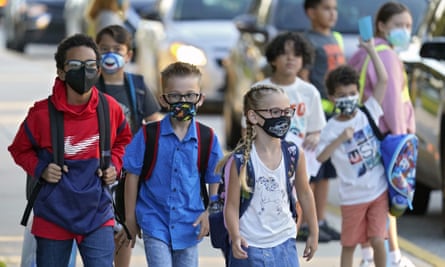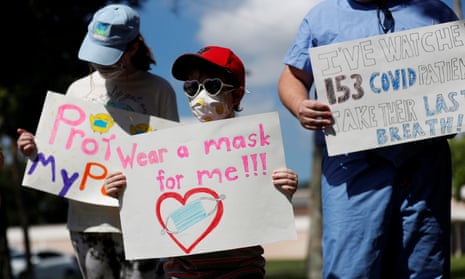In Manatee county, Florida, Maggie, a mother of three, is sending her kids to school every day with two or three extra masks even if, in her fourth grader’s class, only a third of the children are wearing them. Just two days into the new school year, she received a call from school officials saying there were already five known cases of students with Covid-19.
“Based on my kids’ school, and the number of parents that have chosen to not mask their kids, it looks like we’re in the minority,” said Maggie, who asked to be identified by just her first name. “I think the voices who are very anti-mask are very loud.”
Despite recommendations from the American Academy of Pediatrics (AAP) and the Centers for Disease Control and Prevention (CDC) stating that K-12 students should wear masks for in-person learning, Florida’s governor, Ron DeSantis, a Republican, signed an executive order on 30 July that bars school districts from putting mask mandates in place, even though children under 12 cannot yet receive a vaccine. This has left some Florida parents making difficult individual decisions to have their children wear masks, often going up against the political and social norms of their schools and communities.
DeSantis issued his order as the Delta variant of the coronavirus, a highly transmissible version of the virus, continues to rapidly spread across the country. In Florida, pediatric cases of Covid-19 are soaring and new cases overall are reaching all-time highs in a state where about 60% of the population has received at least one dose of the vaccine, after more than a year of highly politicized debate over Covid-19 intervention. This past week, the CDC reported an average of more than 20,000 daily cases of Covid-19 in the southern state.
“Honestly, I don’t know what else we can do. I mean, we did virtual learning last year but that’s simply not an option for us this year,” Maggie said. “So if you don’t want your kid to wear a mask, well then, keep yours at home now, you know?”
Stephanie, an elementary school teacher from Broward county – where, as of Friday, pediatric hospital beds were at 100% capacity – shared a similar opinion. “I think it’s good that parents have choices, but even with the mask mandate, they would still have a choice. If they don’t want their kids to wear a mask, they can do virtual school and keep their kids at home.”
The children themselves, she said, don’t mind. “Last year, I did not have one kid having an issue with wearing the mask. Kids are resilient,” said Stephanie, who asked to use just her first name to protect her job.
In Florida, a swing state, politics seems to heavily influence the decisions of parents and school officials. In Broward, where Democrats significantly outnumber Republicans, the school board voted to maintain the mask mandate despite a statement recently issued by the governor’s office, claiming that Florida’s board of education could withhold the salaries of superintendents and school board members who contradict his ban.
In Miami-Dade county, where Democrats also hold a majority, a final decision is yet to be made, but the public schools superintendent, Alberto Carvalho said last week that he would not allow his decision to be influenced by “threats to his paycheck”.

“A small price to pay considering the gravity of this issue and the potential impact to the health and wellbeing of our students and dedicated employees,” he said in the recent statement.
For Stephanie Cox, a parent of two from Pinellas county – a “purple” county where Democrats barely hold a majority and where the school board has voted to follow the governor’s guidelines – the situation is especially dire since her youngest has type 1 diabetes. Cox said she had bought the best masks she could and had spoken to teachers at her son’s school so he could socially distance while in the classroom. To avoid the school clinic, her son meets her during lunchtime to get insulin in her car and then has lunch with his class outside.
“And still,” she said, “it’s made me lose a lot of sleep at night since he’s in elementary school, where none of the kids are vaccinated yet, and only about 50% are wearing masks.”
Cox has participated in numerous efforts to persuade the school board to defy the governor’s policy. She has sent emails and spoken to school board members on the phone, some of whom have asked why concerned parents didn’t attend school board meetings where people opposed to masks showed up and screamed at officials.
“We weren’t there because we’re in a pandemic,” Cox said. “So a lot of us don’t want to sit in a school board meeting with people screaming. We’ve been sending emails this whole time, but it seems like a vocal group has really gotten its way.”
The governor’s executive order “is not based on science”, said Dr Sonja O’Leary, chair of the AAP Council on School Health. “I think it would be better to have mask mandates in schools and let the people who know science be more in charge of these kinds of things.”
One argument that underlies the governor’s executive order is that children are at a lower risk of getting seriously ill due to Covid-19. Yet, according to O’Leary, “even though we know that Covid isn’t as bad in younger kids, it still hospitalizes some of them and they can still get sick enough to be in the ICU.”
Ruth, another parent of two from Pinellas, who asked not to use her full name, knows that risk first-hand. Over the summer, her children got Covid at camp, where mask-wearing was optional and only reinstituted after the Delta surge. “But it was too late,” she said. “They did have symptoms and were out for four days. And now we’re quarantined with my husband who can’t work, so it’s also affecting the economy.”
Once they go back to school, Ruth says, her children will still wear masks. “We want to help encourage an inclusive environment.”
For now, the AAP continues to advise mask-wearing even in individuals who are vaccinated. “I think when we get to the point where a whole school is highly vaccinated, and I’m talking like 90% vaccinated, we can start talking about not having to wear masks, but I don’t think we’re there yet,” O’Leary said. In the meantime, she thinks kids should continue to wear masks and wash their hands, and that parents should push for mask mandates and get their kids vaccinated as soon as they are eligible.
“It’s unfortunate so much of this has been politicized,” Ruth said. “Frankly, it feels like it’s all for political purposes. Somehow we have a governor taking away the power from superintendents that have a pulse on what’s happening at the local level. And there’s no other reason than someone using our kids as pawns in all of this. It’s really frustrating.”
-
This article was amended on 23 August 2021. An earlier version misidentified Maggie’s home county.
